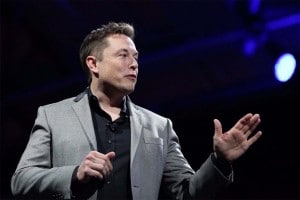
Tesla CEO Elon Musk said the company is on target to have its vehicles operating with Level 5 autonomous technology by the end of the year.
Automakers are spending tens of billions of dollars in their drive to bring autonomous vehicle technology to fruition and if claims made by CEO Elon Musk are on target, Tesla could be on the verge of delivering the world’s first fully driverless vehicle by the end of this year.
The EV company was one of the first to market a semi-autonomous system, dubbed Autopilot, which requires constant vigilance by a driver. A number of manufacturers have now introduced similar systems, such as General Motors’ Super Cruise. Others are pushing to develop systems that could go fully hands-free in limited situation. Tesla, however, claims to be near to perfecting a system that could operate driverlessly anywhere, any time, however.
“I remain confident that we will have the basic functionality for Level 5 autonomy complete this year,” Musk said in a prepared video statement during the opening of Shanghai’s annual World Artificial Intelligence Conference, or WAIC, on Thursday.
(Tesla beats second quarter production expectations.)
Industry groups have defined six distinct levels of autonomous technology, from Level 0, where a car has no capabilities, up to Level 5, where a vehicle can operate fully independently of any human intervention, unaffected by weather, road conditions and other potential obstacles.
Tesla’s current Autopilot system is generally defined as a Level 2 system, allowing a vehicle like the new Model Y to operate without the driver having hands on the wheel under a wide variety of circumstances. But the motorist must remain vigilant and be ready to take control quickly in an emergency.
In a statement to the National Transportation Safety Board, the California-based carmaker stressed that Autopilot “does not make the vehicle autonomous.”
Tesla has come under fire from critics – and faced rebukes from the NTSB – for allegedly over-promising what Autopilot is capable of. There have been a number of crashes, some fatal, blamed on drivers who did not respond to warnings to retake control or, in some instances, who were not warned of a potential collision requiring them to intervene.
Musk has repeatedly promised that Tesla would deliver more advanced versions of Autopilot that could reduce, even eliminate, the need for a driver to be on the ready to regain control. Such updates, however, have been repeatedly delayed.
Exactly how far the more advanced system would go has been a matter of uncertainty. Competitors are working on varying levels of autonomous driving that eventually could reach Level 5, but many experts, such as Toyota’s AI tech chief Gill Pratt, are skeptical that an anywhere/anytime Level 5 system could be on the road before late in the decade.

The viability of Tesla’s Autopilot is gaining acceptance with consumers as autonomous vehicle technology continues to be developed.
(Tesla tops Toyota as World’s Most Valuable Automaker.)
Most of the companies working on self-driving systems are targeting Level 4. Such technology would be “geo-fenced,” meaning it could only operate in areas that have been mapped in much higher detail than with conventional onboard navigation systems. And they would be limited in other ways, likely including the inability to operate under extreme weather conditions, such as heavy snow.
Musk’s comments at the WAIC are raising eyebrows. “I don’t know how they can get there, especially considering the hardware they’re using,” said an industry insider who asked not to be identified by name or company criticizing a competitor.
One reason for such skepticism is the fact that Tesla continues to rely on a suite of camera and radar sensors for Autopilot and more advanced technologies. Virtually all of its competitors believe the most advanced levels of autonomy also will require the use of LIDAR, a high-resolution, three-dimensional LASER technology.
Musk said Thursday that he expects to have “essentially complete autonomy … and I think (it) will happen very quickly.” If so, it would be a major coup, potentially putting what is now the world’s most highly valued automaker well ahead of its competition.
Depending upon the cost of the system, a Level 5 version of Autopilot could become a popular option among consumers, one analyst suggested. But it also could create other opportunities for Tesla.
Some of the most aggressive autonomous driving programs are being run by ride-sharing services like Alphabet’s Waymo and Uber. Both believe they could drastically reduce costs – and lower prices – by taking drivers out of the equation.
Ride-sharing services are facing challenges, however, as Americans pull back due to the coronavirus pandemic. Research from both Capgemini and IBM has warned that such services could face long-term slumps in demand.
(Tesla readying to build new battery operation in California.)
As a result, other studies by the likes of AlixPartners are indicating autonomous research efforts must now shift focus to trucking and delivery applications. For Tesla, that could prove a perfect complement to the all-electric Semi truck the company is developing.
Source: https://www.thedetroitbureau.com/2020/07/tesla-very-close-to-level-5-autonomy-claims-musk/





